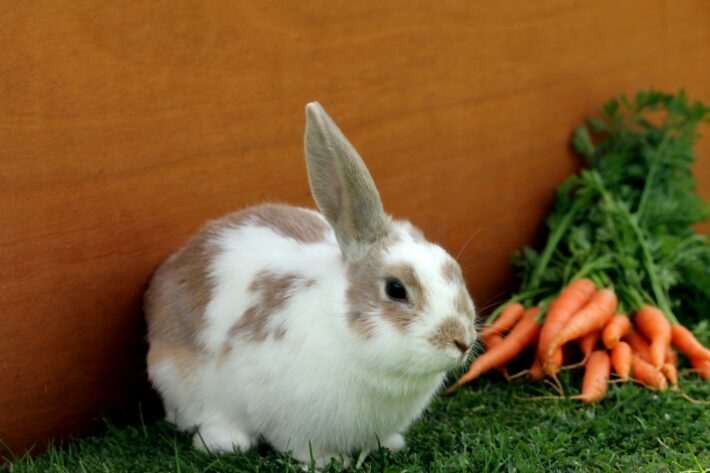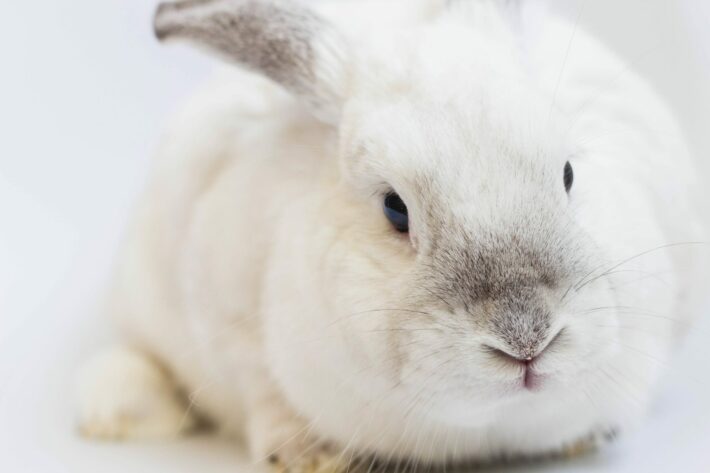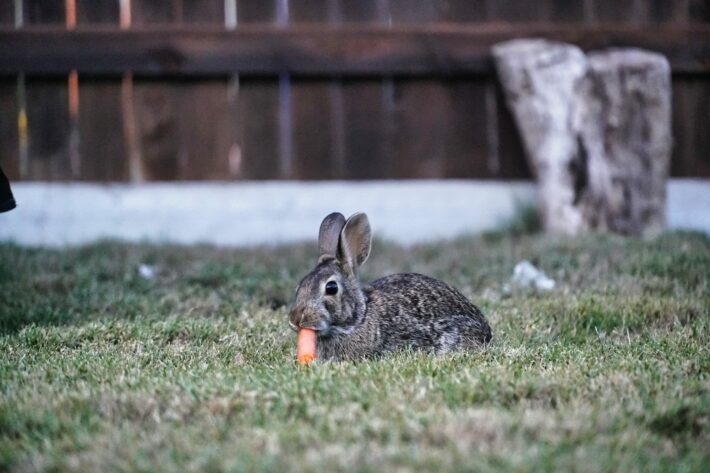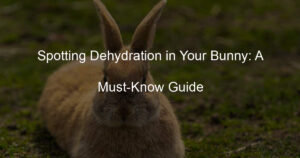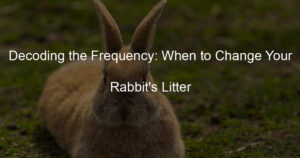Providing a proper diet is essential for maintaining the optimal health of Netherland Dwarf rabbits. These adorable and compact rabbits have specific nutritional needs that must be met to ensure their well-being.
In this comprehensive guide, we will explore the key elements of a Netherland Dwarf rabbit’s diet, including the importance of fresh hay, high-quality pellets, and a variety of fresh vegetables. By understanding their dietary requirements and making informed choices, you can help your Netherland Dwarf rabbit thrive and lead a happy, healthy life.
What are the essential components of a proper diet for Netherland Dwarf rabbits?
A proper diet for Netherland Dwarf rabbits should consist of high-quality hay, which aids their dental health and digestive system. Fresh vegetables, including leafy greens and occasional root vegetables, provide essential nutrients.
Limit pellets to prevent obesity. Always provide fresh water daily. A well-balanced diet ensures optimal growth, weight maintenance, and overall health for these small, adorable pets.
How often should I feed my Netherland Dwarf rabbit to maintain a healthy diet?
Feed your Netherland Dwarf rabbit hay and vegetables twice a day. Portion sizes should be suitable for their size and age to avoid overfeeding and related health issues. Providing fresh water at all times is crucial.
A consistent feeding schedule promotes a healthy digestive system and keeps them happy and active throughout their lifespan.
What types of hay are best for Netherland Dwarf rabbits and why?
Timothy hay and grass hay are ideal for Netherland Dwarf rabbits due to their high fiber content, promoting healthy digestion and preventing dental problems.
These hay varieties help wear down their continuously growing teeth and support the proper functioning of their gastrointestinal tract, contributing to their overall well-being.
Are there specific vegetables that should be included in a Netherland Dwarf rabbit’s diet?
Yes, certain vegetables are particularly beneficial for Netherland Dwarf rabbits. Include leafy greens like kale, romaine lettuce, and spinach, as they offer essential vitamins and minerals. Also, add variety with veggies like carrots, bell peppers, and broccoli in moderation.
However, avoid feeding them starchy or high-sugar vegetables like potatoes and sweet potatoes, which can lead to digestive issues. Introduce new vegetables gradually to avoid upsetting their sensitive digestive system.
Why is it important to limit the intake of fruits in a Netherland Dwarf rabbit’s diet?
Although fruits are tasty treats, they contain high sugar content, which can be harmful to Netherland Dwarf rabbits. Excessive sugar intake can lead to obesity, dental problems, and gastrointestinal issues.
If given as treats, offer small portions of fruits like apples, berries, or papaya occasionally. Focus primarily on hay and vegetables as their main diet to ensure proper nutrition and prevent health complications.
What role do pellets play in a Netherland Dwarf rabbit’s nutrition, and how much should be given?
Pellets should be considered supplementary rather than the main part of a Netherland Dwarf rabbit’s diet. They provide additional nutrients but can be high in calories, leading to obesity if overfed.
Offer limited amounts of high-fiber, premium-quality pellets specifically formulated for dwarf rabbits. Generally, 1/8 to 1/4 cups of pellets per day is sufficient, adjusting the quantity based on the rabbit’s age, weight, and overall health.
This table provides valuable information about the role of pellets in a Netherland Dwarf rabbit’s nutrition.
| Benefit | Types of Pellets | Recommended Quantity |
|---|---|---|
| Essential Nutrients | Timothy-based Pellets | 1/8 cup per day |
| Support Growth | Alfalfa-based Pellets | Only for young rabbits |
| Prevent Obesity | High-Fiber Pellets | Adjust according to weight |
| Convenience | Combined Pellets | Follow packaging instructions |
| Calcium Control | Low-Calcium Pellets | For rabbits prone to urinary issues |
Are there any specific dietary supplements recommended for Netherland Dwarf rabbits?
In most cases, a well-balanced diet consisting of hay, vegetables, and limited pellets should fulfill a Netherland Dwarf rabbit’s nutritional requirements.
However, if there are concerns about specific nutrient deficiencies or health issues, it is essential to consult a veterinarian before introducing any supplements. Over-supplementation can be harmful and may disrupt the delicate balance of their diet.
What are the common dietary mistakes to avoid when feeding a Netherland Dwarf rabbit?
One common mistake is overfeeding pellets, which can lead to obesity. Additionally, offering inadequate hay can cause dental issues and gastrointestinal problems. Avoid giving too many high-sugar fruits and starchy vegetables.
Abruptly changing their diet can also upset their sensitive digestive system. Lastly, using inappropriate treats like sugary or processed snacks is best avoided, as it can negatively impact their overall health.
How can I prevent obesity in Netherland Dwarf rabbits through their diet?
Preventing obesity in Netherland Dwarf rabbits involves providing a balanced diet with proper portion control. Limit the number of pellets and treats, focusing on hay and fresh vegetables. Monitor their weight regularly and adjust their diet accordingly.
Engage them in regular exercise and play to keep them active and maintain a healthy weight. Obesity can lead to serious health issues, so maintaining a healthy diet and lifestyle is crucial.
What are the signs of a well-balanced diet in a Netherland Dwarf rabbit?
A well-fed Netherland Dwarf rabbit will exhibit a healthy weight and body condition, with a glossy coat and bright, alert eyes. They will have regular, firm fecal pellets and will be active and playful throughout the day.
Proper nutrition supports their overall vitality, promotes good digestion, and ensures their overall happiness and well-being.
What impact does a proper diet have on the dental health of Netherland Dwarf rabbits?
A proper diet significantly impacts the dental health of Netherland Dwarf rabbits. Chewing on hay wears down their continuously growing teeth, preventing overgrowth and dental problems. Fiber-rich hay also promotes healthy digestion, reducing the risk of gastrointestinal issues.
Including vegetables with a crunchy texture helps to keep their teeth clean and healthy. Ensuring a diet that supports dental health is crucial for these small rabbits, as dental issues can be painful and lead to serious health complications.
Can certain foods lead to digestive issues in Netherland Dwarf rabbits, and how can they be avoided?
Yes, certain foods can cause digestive problems in Netherland Dwarf rabbits. Foods high in starch, sugar, or fat can disrupt their sensitive digestive system and lead to issues like diarrhea or bloating.
Avoid feeding them human treats, sugary snacks, or foods meant for other animals. Stick to a diet mainly consisting of hay, fresh vegetables, and limited, high-quality pellets to maintain their digestive health and prevent discomfort.
Are there any specific food restrictions for Netherland Dwarf rabbits with medical conditions?
Netherland Dwarf rabbits with certain medical conditions may require dietary adjustments. For example, rabbits with dental issues might benefit from softer vegetables or hay alternatives.
Rabbits prone to urinary problems may need a diet with lower calcium content to prevent stone formation. In such cases, it is crucial to consult a veterinarian for personalized dietary recommendations that cater to the specific needs of the rabbit’s health condition.
How can I transition my Netherland Dwarf rabbit to a new diet successfully?
To transition a Netherland Dwarf rabbit to a new diet, do it gradually over several days to avoid upsetting its delicate digestive system. Mix small amounts of the new food with their current diet, slowly increasing the proportion of the new food while reducing the old.
Monitor their response and adjust the transition pace accordingly. Patience is essential during this process, as rabbits can be sensitive to sudden dietary changes.
What are some creative ways to enrich a Netherland Dwarf rabbit’s diet and stimulate its appetite?
To enrich a Netherland Dwarf rabbit’s diet and stimulate its appetite, introduce new vegetables and herbs in moderation to add variety to their meals. Create foraging opportunities by hiding treats or veggies around their living space, encouraging natural behaviors.
Offer safe, non-toxic chew toys made of untreated wood or woven grass to satisfy their gnawing instincts. Rotate their vegetables to keep meals exciting and enjoyable. Engage them in interactive play to stimulate their minds and keep them active and engaged.
Can Netherland Dwarf rabbits eat fruits daily?
Netherland Dwarf rabbits can eat fruits, but they should be given in moderation. The high sugar content in fruits can lead to health issues like obesity and dental problems. It’s best to offer small amounts of fruits as occasional treats to prevent any adverse effects on their health.
How do I know if my Netherland Dwarf rabbit is not liking its diet?
If your Netherland Dwarf rabbit is not enjoying its diet, you may notice a decreased appetite, disinterest in food, or selective eating. It’s essential to offer a varied diet and observe their preferences. If you suspect any issues, consult with a veterinarian to rule out any underlying health concerns.
Are there any toxic foods that should be avoided in a Netherland Dwarf rabbit’s diet?
Yes, several foods are toxic to Netherland Dwarf rabbits and should be strictly avoided. These include chocolate, caffeine, onions, garlic, and any plant from the lily family. These toxic substances can cause severe health problems and even be fatal for rabbits.
Can I give my Netherland Dwarf rabbit commercial rabbit treats?
Commercial rabbit treats can be given to Netherland Dwarf rabbits, but they should be offered sparingly. Many commercial treats are high in sugar and low in nutritional value. It’s crucial to read the ingredient labels and opt for treats made with natural, healthy ingredients.
How often should I change the vegetables in my Netherland Dwarf rabbit’s diet?
To provide a balanced diet and avoid monotony, change the vegetables in your Netherland Dwarf rabbit’s diet every few days. Offer a rotation of safe vegetables, ensuring they receive a variety of nutrients. Frequent changes also reduce the risk of any particular vegetable causing digestive issues due to overconsumption.
In summary
A proper diet for Netherland Dwarf rabbits is vital for their overall health and well-being. A well-balanced diet consisting of high-quality hay, fresh vegetables, and limited pellets ensures they receive essential nutrients and maintain a healthy weight. Careful consideration of the types of hay and vegetables offered, along with portion control, helps prevent obesity and digestive issues.
Avoiding high-sugar fruits and starchy vegetables is essential to maintain their delicate digestive system. By providing a diverse and stimulating diet, enriched with foraging opportunities and interactive play, we can keep these small, adorable companions happy and thriving. Regular monitoring and consulting with a veterinarian ensure a long, happy life for our beloved Netherland Dwarf rabbits.


